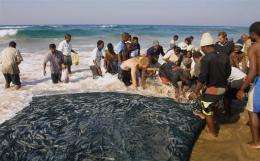Warmer ocean brings fewer sardines to S.Africa

Millions of sardines have begun their annual migration down South Africa's east coast, but fewer fish are making the journey due to rising ocean temperatures, a researcher said Monday.
Known as the Sardine Run, the spectacular marine migration with schools miles long attracts dolphins and birds, spawning a cottage industry for the tourists who flock to the Indian Ocean coast in KwaZulu-Natal province to witness the spectacle.
"Our best Sardine Runs happen when the water is cold. Water is still warm along the KwaZulu-Natal coast and at this stage, things are not looking good," said Sean O'Donoghue, a researcher at the University of KwaZulu-Natal.
In winter, when the ocean's temperature dips below 20 degrees (68 Fahrenheit), millions of sardines travel 2,000 kilometres (1,250 miles) along the coast up as far as the port city of Durban.
"The temperature along the KwaZulu-Natal coast is rising just above what sardines can tolerate," O'Donoghue told AFP.
"We are really at the limit. If the temperature gets warmer with the global warming... sardines are unlikely to come as far up the coast," he said.
The Sardine Run plays a critical role in the region's marine ecosystem. Tens of thousands of dolphins, a thousand sharks and more than 100,000 sea birds feed off the sardines when they pass through the coast waters that offer little nutrition during the rest of the year.
Up to 10 million fish join the migration, which attracts about 100,000 visitors to the coast during June and July.
(c) 2009 AFP













